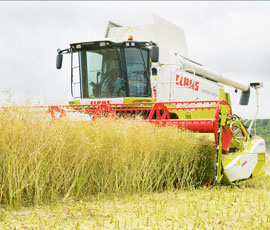Pod shatter causing yield losses

Oilseed rape yields are generally lower than last year, and many crops are suffering badly from seed shedding and high admixtures.
“People are a little bit disappointed because they had big yields last year and there’s a lot of variation between fields and varieties this year,” said David Leaper, arable technical manager at Openfield.
“It’s a real mixed bag, with very little consistency on farm and from the limited trials we’ve seen to date.”
Wet weather had resulted in poor relatively poor pollination, and the lack of sunlight restricted pod fill, said Mr Leaper.
“Plant populations and canopies have been better than ever, but there are a lot of small seeds and high admixture.”
Oil contents were lower than last year, at 42-43%. “And we may see crops with oil contents below 40% for the first time in many years.”
Sclerotinia hadn’t been a widespread problem, but verticilium wilt was common, he added.
However, one of the greatest problems, given the suddenly rapid ripening and uneven crops, was seed shedding, with yield losses of up to 20% on the cards for many farmers.
“We’ve received widespread reports of large amounts of seed running off cutter bars in the past week, in particular.
“And there’s been far too much white haze for comfort across many crops ahead of combining, suggesting substantial pre-harvest losses as well,” said Mr Leaper.
“This really isn’t surprising given the unbelievable speed with which so many crops have gone from green and immature to extremely dry this season, putting intense pressure on the pods.
“You only have to stand in them as the sun comes out to hear the tell-tale chorus of pod-popping.”
As the second bad season in a row for seed shedding, it would encourage more farmers to opt for varieties with genetic resistance to pod shatter, he added.
“Alongside the pod-sticking products that are proving especially valuable this season, pod shatter resistance has an important role to play in improving oilseed rape performance reliability in our increasingly uncertain climate.”
